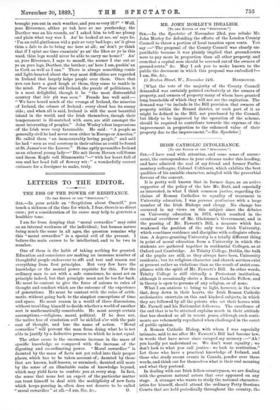LETTERS TO THE EDITOR.
THE EBB OF THE POWER OF RESISTANCE.
[TO THE EDITOR OF THE " SPECTATOR."1
'SIR,—In your article on "Scepticism about Oneself," you -touch a sickness of the time for which, I fear, there is no direct -cure; yet a consideration of its cause may help to generate a healthier tone.
I am far from denying that "moral cowardice" may exist as an internal weakness of the individual ; but human nature -being much the same in all ages, the question remains why 'this "moral cowardice" is a special evil of the present. I 'believe the main causes to be intellectual, and to be two in ,number.
One of them is the habit of taking nothing for granted. Education and conscience are making an immense number of thoughtful people endeavour to sift and test and reason out everything from first principles. But very few have the knowledge or the mental power requisite for this. For the -ordinary man to act with a safe conscience, he must act on principle indeed, but that principle must not lie too far back. He must be content to give the force of axioms to rules of thought and conduct which are the outcome of the experience of generations. He must be content with the rules of arith- metic, without going back to the simplest conceptions of time and space. He must reason in a world of three dimensions, -without troubling himself to decide whether a world of another sort is mathematically conceivable. He must accept certain assumptions,--religious, moral, political. If he does not, the native hue of resolution will be sicklied o'er with the pale • east of thought, and lose the name of action. "Moral cowardice" will prevent the man from doing what he is not able to justify by a deductive process to which he is not equal.
The other cause is the enormous increase in the mass of specific knowledge as compared with the increase of the digesting and co-ordinating power. "Moral cowardice" is daunted by the mass of facts not yet ruled into their proper places, which has to be taken account of ; daunted by those that are known, half-known, or surmised; daunted still more by the sense of an illimitable realm of knowledge beyond, which may yield facts to confute you at every step. In fact, the sense that none but an expert of the particular matter can trust himself to deal with the multiplicity of new facts which keeps pouring in, often does not deserve to be called
moral cowardice" at all—I am, Sir, &c., 0.






































 Previous page
Previous page